It is customary for any reflection on translation to begin by referring to etymology. It is thus that George Steiner, in his book After Babel: Aspects of Language and Translation, identifies the root sense of 'translation' as "to move laterally, to proceed point to point on a level plane." This privileging of etymology over semantic history has characterised much of translation theory, and a survey of texts on the subject shows an overriding, almost exclusive, preoccupation with the movement between languages and the violence that such movement entails. There is another violence, however, equally powerful, which manifests itself in its own specific way: that of a signature conquering a translated text. In these instances we can no longer consider a translation to be a displacement, but rather the occupation, plundering, or re-inscription of a name. There is no longer infinite opportunity for displacements to multiply indefinitely, but a limited opportunity for someone to sign their name where another had previously done so. There is no longer a collision between languages, but another problem equally inseparable from the act of writing: how can a person speak using someone else's name?
Since their earliest programmatic texts, the Brazilian concrete poets have always extolled the practice of translation. From the perspective of the movement from one language to another, and of translation as mediation, their work can be seen as an attempt by an avant garde group to position itself within the field of Brazilian literature by introducing a set of writers they referred to as paideuma. Taking inspiration from Ezra Pound's thinking, they established a number of principles concerned, predominantly, with technical questions about poetic language. However, this must also be seen as a titanic effort to re-appropriate these authors' poetics, the most obvious consequence of which has been the fact that certain writers (such as e. e. cummings and Ezra Pound himself) are 'naturally' associated with the concrete movement. In this type of translation—which, to distinguish it from mediating translation, we can term possessive—the poet attempts to unite their own name with that of the poet being translated, and become their 'natural' addressee in the target language. This appropriation—which, when the concrete poetry movement was emerging, was overlooked in favour of their avant garde objectives and their strategy of introducing foreign authors (which was, we must remember, also a process of dissemination and democratisation)—began to acquire greater independence in the individual projects taken on by Haroldo and Augusto de Campos in Traduzir & trovar (Translating & Ballad Making) in 1968. Although they shared some common ground, as is evident from Traduzir & trovar and other books they compiled together, each brother was cultivating a unique and distinct profile. Haroldo, an indefatigable craftsman, attempted to re-inscribe his name in certain texts, such as the Bible and The Iliad, for which authorship is impossible because they belong to the universal tradition, that is: to everyone and to no one. Despite this, in his translation of Ecclesiastes, Haroldo incorporated his own readings and left his authorial fingerprint through—as he himself explains—a "marginal annotation or signature left in the interpreter-translator's wake":
Qohélet buscou // descobrir / o prazer das palavras (XII, 10)
e excesso de estudo / entristece a carne (XII, 12)
[Koheleth sought // to discover / the pleasure of words] (XII, 10)
[and much study / saddens the flesh] (XII, 12)
By cramming Mallarmé ("the flesh is sad") and Barthes (The Pleasure of the Text) into his translation, this "wake" leads us to Haroldo's own work and forces us, as readers, to multiply the people who are speaking in the text.
In contrast, Augusto takes a different strategy: like an exacting collector who will only accept the rarest of items, Augusto looks for and chooses texts with an interdict hanging over them: they are the untranslatables. Augusto redefines his poetics using what John Cage called "the practicality of the impossible," and shows that only a truly difficult text allows us to appreciate the act of translation: in poetry, experience and language are one and the same thing. This is the case for the Provençal poets of the trobar clus, for the Elizabethans, for the Baroque Quirinus Kuhlmann, for Gertrude Stein or Gerard Manley Hopkins. This difficulty demands that the poet breathe life into the poem because, as Augusto says of Hopkins, "to translate him without reproducing his complex formal elaboration amounts to annihilating his personality, consigning him to a mass grave, killing the poet." Translators must be poets, because only a poet can create—through the act of copying—an original text.
The most curious effect of possessive translation is that the translator assumes authorship while the translated poet becomes a title or an object. The struggle between subordination and domination, which all translation involves, is resolved in a displacement that only a translation of this kind can achieve: titles such as Bere'shith (A cena da origem) [Bere'shith (Scene of Origin)] and the Ecclesiastes are signed by Haroldo de Campos; just as Augusto de Campos signs Rilke: Poesia-Coisa (Rilke: Thing-Poems) and Hopkins: a beleza difícil (Hopkins: The Difficult Beauty).
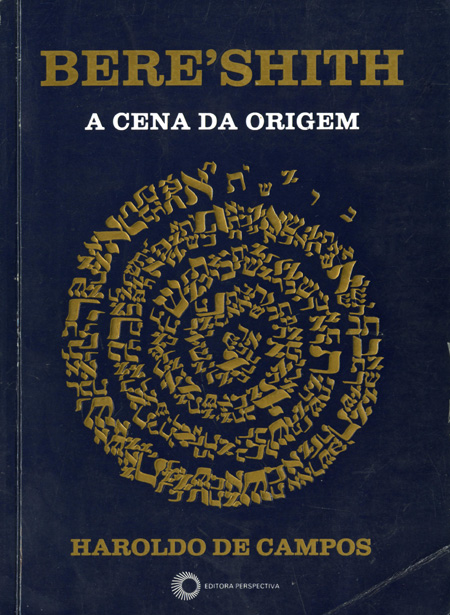
Front cover of Bere'shith (A cena da origem), a translation of Genesis and The Book of Job by Haroldo de Campos, who features on the cover as the author.
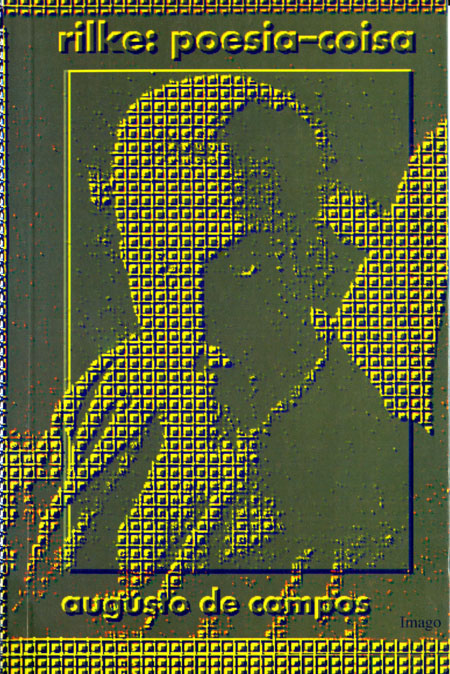
The translated poet appears as the title and Augusto de Campos as the author: Rilke: Poesia-Coisa
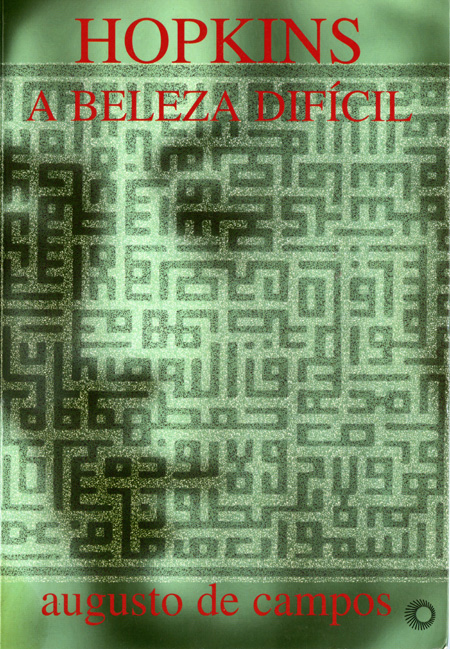
Front cover created by Augusto de Campos in which he uses an inscription in Arabic superimposed onto Hopkins' face (Hopkins: a beleza difícil).
On the jackets of these two books, Augusto plays with the poets' faces, masking them: he combines Rilke with a panther, and superimposes onto Hopkins an Arabic calligram that resembles a labyrinth. By layering images in this way, Augusto shows that the struggle for sovereignty enacted through possessive translation (Valéry has referred to the act of translating as "dancing in chains") is not just a matter of signing one's name to a text. This struggle conceals an essential problem: that of the poem as a site of experimentation with "I," or of the poetic voice as a mask. "Colocar a mascara" [Put the mask on,] said Augusto in his poem "caracol" [snail].
When this masking is successful, it means that the translated poems become classics in the target language too. Very few examples exist, and none more astonishing than that of Edward Fitzgerald and his English versions of Omar Khayyam's poems. Every translator will, at some point during their work, stumble upon these translations, which foreground a collision between languages, subjects and historical eras, effectively duplicating the existence of a classic: one in the original language, and the other in English. In his work on Edward Fitzgerald, Augusto wrote: "tentei roubar o rubai de fitzgerald / para a nossa língua" [I tried to rob fitzgerald's ruby / for our language.] But how could he have stolen a text from Fitzgerald, who is a mere translator and not the owner, creator or producer of that text? Augusto tries to repeat what Fitzgerald did with Omar Khayyam: translation as possession and duplication––a strange duplication that consists of producing another original.
Jorge Luis Borges, who in 1925 wrote a preface to an edition of Fitzgerald's translated poems put together by his father, was always intrigued by what he termed the "enigma of Edward Fitzgerald." How can we explain the happy encounter between a wise thirteenth-century Persian and a nineteenth-century Oxford scholar? Borges proposed three theories, all of them "metaphysical" in nature. Either this encounter was the result of "transmigration" (a word sharing a prefix with translation), or the men were two moments of God (a pantheistic hypothesis), or it was a "beneficent chance." In all three, Borges is enquiring into possible explanations for the encounter. But what he says about its consequences is much more intriguing. "A miracle happens," he writes. "From the fortuitous conjunction of a Persian astronomer who condescends to write poetry, and an eccentric Englishman who peruses Oriental and Hispanic books, perhaps without completely understanding them, emerges an extraordinary poet who does not resemble either of them." Borges pinpoints the figure of a spectre or third-party, something that emerges from a text but seems entirely original. This third-party is a poetic voice that is subjected to a complex process of depersonalisation and re-personalisation from which a new poet emerges, one that is different to the two who created him. The "eloquent disappearance of the author" required by Mallarmé is achieved in these translations in a unique way: the "I" disappears, but only in order to reappear masked, unrecognisable, proof of a new power: the power of the fiction of the poetic voice. What happens is, to use Gilles Deleuze's words, that "individuals find a real name for themselves [ . . . ] only through the harshest exercise in depersonalization, by opening themselves up to the multiplicities everywhere within them, to the intensities running through them." Thus the impossibility of translating these poems is not purely linguistic.
I am soft sift
In an hourglass
writes Hopkins in his poem "The Wreck of the Deutschland," and Augusto expands:
Eu sou só pó
De uma ampulheta
[I am only the dust
Of an hourglass]
"Soft sift," "só pó": there is no separation between experience and language, no attempt at circumlocution. The "I" is subjected to the same contortions in different languages, in different historical periods, from the perspective of different beliefs. In the case of Hopkins, Augusto is attempting to tackle a religious Jesuit poet from the perspective of modernist agnosticism. Augusto himself wrote "it should be clear that, just as an actor performs a role, I assumed a persona and let myself be filled by the poet's generous passion and compassion, putting aside the reservations arising from my agnosticism. Here, a suspension of belief was absolutely essential. Otherwise, I don't think I would have managed to complete so demanding and exhausting a task: that of facing [ . . . ] Hopkins' poetry." The religious hurdle can only be overcome through belief in the inventive power of the poetic word. In the case of Rilke's "thing-poems," the translator is faced with texts that are characterised by depersonalisation and objectivity: in this instance, it is subjectivity that is the obstacle, and the translator must rely on the very poems he is translating in order to overcome it. The translator must invent masks, an "actor" who plays the role of believer (but only after suspending his belief), and a poet, who touches the "thing" via the poems written in another language. What takes place is the re-personalisation of depersonalisation, and the objectivity of subjectivity. Possessive translations meet Mallarmé's demand: the first person voice disappears in order to reappear as a different first person voice. What is more, it doesn't actually matter whether "I" is used because the pronoun no longer evokes a fixed, unshakeable reality, nor an extra-textual subject, but the void of an experience that the translation tries to feign. The "I" is only dust (the "soft sift") formed from the myriad corpuscles making up this ghost, which no longer belongs to the translated text, nor to the translator.
This series of difficulties and negotiations in possessive translation go through various phases and guises in Augusto's work, but here I am concerned primarily with two of them: translation as appropriation and translation as re-serialisation.
Appropriation: "the sail and the cloth"
From all of this the following may be deduced: all translation secretly desires to take control of a text, and sometimes, even of the author. The paths by which a text may arrive in another language are innumerable, but a strong translation tries to establish itself as the only path into that language, one that shuts off all others. Who will want to translate the Provençal poets, or Hopkins, or cummings into Portuguese after Augusto de Campos's versions? How many years will we have to wait, what new age must dawn, before a writer decides to give us another version of the Homeric epic after the complete translation of the Iliad by Haroldo de Campos? The translation of Finnegans Wake into Portuguese by Donaldo Schüler is a good example. After asking permission to use the de Campos brothers' Portuguese title (Finicius Revém), the translator dedicated the work to Haroldo de Campos in a gesture as much of legitimisation and desire for approval as of gratitude and debt. Translating Joyce's text already seems impossible; but is it not doubly impossible to translate for a second time the fragments that the de Campos brothers have already rendered into Portuguese? The inhibiting presence of the de Campos translation becomes clear in the very first line. Since the São Paulo poets' version reads "riocorrente" ("riverrun" in Joyce's original), Shüler had to contort the line in order to avoid repeating the same word: "rolarrioanna e passa por Nossenhora d'Ohmen's roçando a praia, beirando A Bahia, reconduz-nos por cominhos recorrentes de Vico ae de Howth Castelo Earredores." "Riocorrente" seems to be the literal and also the most natural translation, especially after the powerful impact that the edition of Panorama do Finnegans Wake de James Joyce (Overview of Finnegans Wake by James Joyce) had in 1971. They say that no one steps into the same river twice; but, would adopting "riocorrente" not have meant diving into the river of the de Campos brothers, who had used and appropriated this neologism in their poem "Heráclito revisitado" (Heraclitus revisited) in A educacão dos cinco sentidos (The education of the five senses)?
The case of Ana Cristina César, another poet who saw the translator's task as appropriation and the inscription of a name, is similar to that of Schüler. Augusto de Campos is mentioned more than a couple of times in Ana Cristina César's writing, and, while it's clear that Augusto was not among her favourite poets, there is nonetheless a curious obsession with the figure of Augusto de Campos as translator. And although her assessment of his translations oscillates between admiration on the one hand and disagreement and discomfort on the other, the references are so frequent that the figure of Augusto comes to be a ghostly silhouette, haunting some of her critical texts.
In "Traduzindo o poema curto" (Translating the short poem), Ana C. examines a number of poems by including the originals, a version in Portuguese by another translator, and a version of her own. This method of multiplication is suspended when she analyses the sonnet "Salut" by Mallarmé: instead of adding her own version, as she had done up until that point, Ana Cristina César contents herself with transcribing Augusto de Campos's version. Although Ana C. seems to surrender to the power of Augusto's translation (as though it wouldn't be worth the effort to create a new version), she tries to find a way of inscribing her own name and her own reading on the poem. In a note to Augusto's version of the sonnet's final line—"Le blanc souci de notre toile"—Ana Cristina César introduces a suggestion that can be read as a correction: "Augusto de Campos, in his translation into Portuguese, renders it thus: 'um branco afã de nossa vela' (He could have used tela [cloth], retaining the same rhythm and metre)." What does she mean by this correction? Is it an attempt to transcend the weight of his possessive translation by using his own methods (the explanation she offers is technical)? Or is this the meeting of two opposing imaginations: one optic (Augusto de Campos's), playing with the gradations of light on the "sail" ("vela"); the other haptic, boldly searching for the presence of touch in the "cloth" ("tela")? Or is she attempting to revert to the literal in order to condense the dense Mallarmean metaphor of a single white "toile"—which contains three things, "the page of writing, the surface of a tableau and a boat's sail"—in the face of Augusto's choice? What is clear, in any case, is that Ana Cristina is obliged to absent herself and hide in the parentheses, outside the text and outside the translation, as though what has once been translated can never be translated again. Augusto's possessive translation thus fulfils one of its aims: to exist as a creation and to prevent new versions. The translated poem thereby gains a strange autonomy, a rare sufficiency: a new poem, both original and translated, written in the translator's own language.
Re-serialisation: Augusto de Campos overpowers Blake
Possessive translations, in which the translator's name is inscribed, provide us with a possible model for classifying translations in which technical expertise or idiomatic fidelity are less important than the translator's fingerprint or the wake they leave behind. In the most successful cases the translator's name is included as a second author or as an irrevocable intermediary: Sophocles and Hölderlin, Goethe and Nerval, Poe and Baudelaire, Goethe and the Diwan poems, Khayamm and Fitzgerald, Poe and Cortázar. Unlike weak translations in which the translator tries to hide himself or erase evidence of his intervention, possessive translations forge a third-party, a mask for the translated poet.
These translations can, however, be even more radical. Possessive translations are like post-mortem betrothals in which both poets unite their names forever in a marriage that revives the dead poet in the wedding dress of a new language. But these possessive translations can approach an even more radical phase in an even more complete appropriation: that is, vampiric possession. The translated poet is no longer given a mask, but is used as a mask. Augusto de Campos approaches this vampiric kind of possessive translation in what he terms "intranslations": intersemiotic translations in which visual elements, alien to the translated text, interfere. In these compositions, the original is not only translated, but also formatted, visually and typographically re-interpreted, and rearranged. In "homage to edward fitzgerald (1974)," for example, Augusto de Campos takes two words from the following stanza in Rubaiyat:
of threats of hell and hopes of paradise!
one thing at least is certain—this life flies;
one thing is certain and the rest is lies;
the flower that once has blown for ever dies.
The intranslation uses the end of the stanza's second line to create a figure that, on the one hand, highlights the anagrammatic microstructure with which Fitzgerald works as a translator, and, on the other hand, visually conveys the experience of brevity and evanescence. Khayyam and Fitzgerald's experience of the fleeting nature of life acquires a new mask in this intranslation.
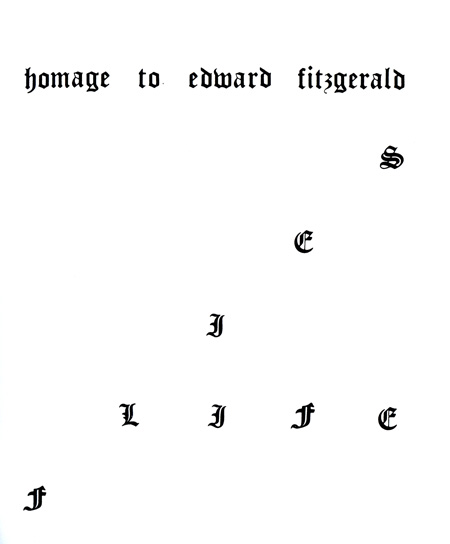
"A life flies," intranslation by Augusto de Campos of Edward Fitzgerald's version of Omar Khayyam's poem.
Perhaps nothing is more revealing than the prefix "in," which highlights inscription and conquest in contrast to the "trans" of translation and transposition. Occupation, rather than movement. The term also plays on the word "introduction," as though the translator has assumed the role of presenter, a bridge to otherness. In Viva vaia (Bravo Boo), his collected works up to 1979, the "Intraduções" (Intranslations) make up a chapter with poems composed between 1974 and 1977. In it, the Provençal poet Bernart de Ventadorn, Edward Fitzgerald, Ausonius and William Blake are the poets subjected to this process of rewriting. Translated fragments of their work are included in a book authored by Augusto de Campos, and as such must be read as part of his oeuvre. Of all these examples, the most surprising is Blake. Seemingly remote from the inclinations of the São Paulo poet, Blake was particularly preoccupied with negotiating between poem and image and was, as is well known, not only a great poet but also a distinguished artist. So in the two intranslations included in Viva vaia ("O Tygre" and "A rosa doente," Blake's "The Tyger" and "The Sick Rose"), it is not just Blake's texts that have been plundered. There is also a movement away from the English poet's imagery towards the kind used by Augusto de Campos. In the poem "O Tygre," Augusto incorporates a nineteenth century dervish wall inscription, a technique he has used elsewhere, such as on the cover of Hopkins: A beleza dificil.
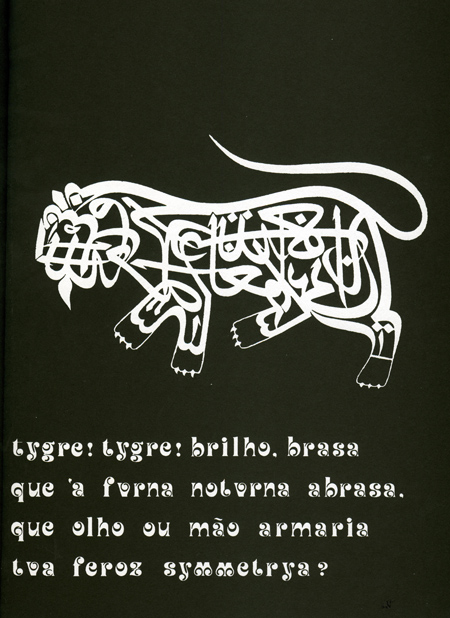
Fragment from the intranslation "O Tygre" by Augusto de Campos of Blake's famous poem, "The Tyger."
In "A rosa doente," he uses a spiral figure, which in those years had begun to displace the reticular organisation predominating in Augusto's poems of the concrete era.
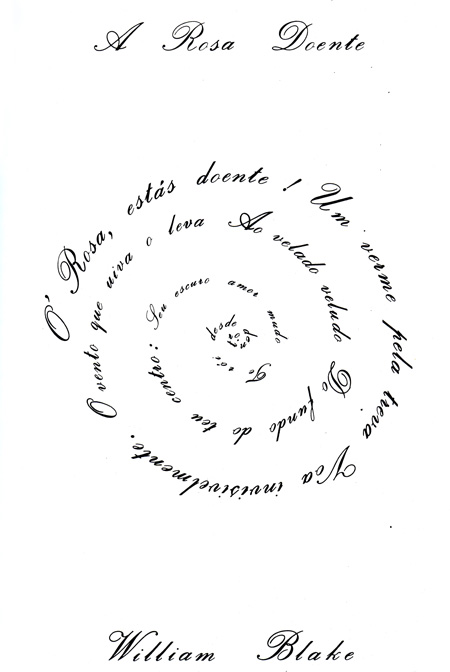
"A rosa doente," another visual translation by Augusto de Campos of a William Blake poem, "The Sick Rose."
The effect of these displacements is that the intranslations can (or should) be read in the context of Augusto de Campos's own work—work in which metamorphosis acquires power by expanding into new fields, translation being one of the most important. Therefore, the "tygre" invites or encourages us to read it alongside the rest of Augusto's oeuvre. "Eye" and "hand," seeing and writing: the metamorphosis takes place between two languages, between different codes (visual and linguistic), between different worlds (animal and human) and the result is a "fearful symmetry":
tygre! tygre! brilho, brasa,
que 'a furna noturna abrasa
que olho ou mão armaria
tua feroz symmetrya?
[tiger! tiger! burning bright
in the forests of the night
what immortal hand or eye
could frame thy fearful symmetry?]
The metamorphosis, which challenges the principle of identity, reveals the process by which sameness becomes difference. Two qualities are introduced by the image of animals such as the tiger: on the one hand, the incommunicable space beyond words in which each animal moves (an intense experience, purely visual, like the "silence" of Rilke's panther). On the other hand, the poet's attempt to approximate an experience of otherness that transforms nature into a hieroglyph (like the tiger in the dervish wall painting). These are interpretations of a transformation seen from two different perspectives: from the point of view of life experience, and from the point of view of language as the poet's tool. The unutterable (or the aphasic) and the hieroglyph re-emerge in the intranslation "A rosa doente." Once again, in Augusto de Campos's visual version, an animal (a worm) is subjected to a torsion that makes it almost unrecognisable (or illegible). The worm traces the figure of the spiral—an image of destruction and shipwreck (the mäelstrom)—as a consequence of his love for the rose.
A Rosa Doente
Ó Rosa, estás doente!
Um verme pela treva
Voa invisivelmente.
O vento que uiva o leva
Ao velado veludo
Do fundo do teu centro:
Seu oscuro amor mudo
Te rói desde dentro.
Verse translation by Augusto de Campos
[The Sick Rose
O Rose, thou art sick!
The invisible worm,
That flies in the night,
In the howling storm,
Has found out thy bed
Of crimson joy;
And his dark secret love
Does thy life destroy.
Original by William Blake
La rosa enferma
Oh Rosa, estás enferma.
El invisible gusano
que vuela en la noche
cuando la tormenta ruge
ha encontrado tu lecho
de dicha carmesí
y su oscuro amor secreto
destroza tu vida.
Translation into Spanish by Pablo Mañé Garzón]
While the translation into Spanish by Pablo Mañé Garzón is faithful to various terms in Blake's poem, Augusto de Campos's version commits a number of infractions: he does not translate key words ("storm," "bed," "crimson," "secret," "destroy," "life") and he introduces some of his own words: "velado" [veiled] "mudo" [mute] "centro" [centre.] Many of his modifications are intended to maintain the rhyme (hidden by the visual layout) and to introduce his own patterns of sounds, especially around bilabials. But this formal care also entails semantic displacement: Blake's visual game of colours is displaced in favour of an emphasis on sound opposition ("uiva"/"mudo," [howling/mute]), and a number of references to space ("centro" [centre]) and touch ("velado veludo" [veiled velvet]) which the original lacks. Out of the experience of love leading to ruin, Augusto de Campos uses the poem to actively involve the reader's gaze. The eye follows the spiral and is forced to recognise its own limitations. We are faced here with one of the leit-motivs of Augusto's poetry: the eye's love of clarity is confronted by opacity—by an illegible image. The sick rose, which in Blake's poem naturally invites other interpretations, can be read in Augusto de Campos's version as the sickness of the image.
However, Augusto's decision to use Blake's poem for his intranslation can also be read as a reflection on the act of translating. That which in Blake's poem is revealed as the metamorphic power of nature (paradoxically uniting love and death), in Augusto's version becomes the metamorphic, and also paradoxical, power of translation. This power also entails an act of love, but one that presupposes the death of the translated text in order to transform it into something new. Like the "verme" ("worm") of the poem, love and destruction are two symptoms of the same ailment.
In After Babel, George Steiner states that "translation is an exemplary case of metamorphosis." He adds that Goethe, like Benjamin after him, "saw that the life of the original is inseparable from the risks of translation; an entity dies if it is not subject to transformation." "Life flies," death "roí desde dentro" [gnaws from the inside]. There's not much left, it seems, that the poet and the poem can do, except perhaps to offer us overpowering transformations, unexpected metamorphoses, a multiplicity of masks, the "brilho" and "brasa" burning in the word of experience, whether original or translated.
